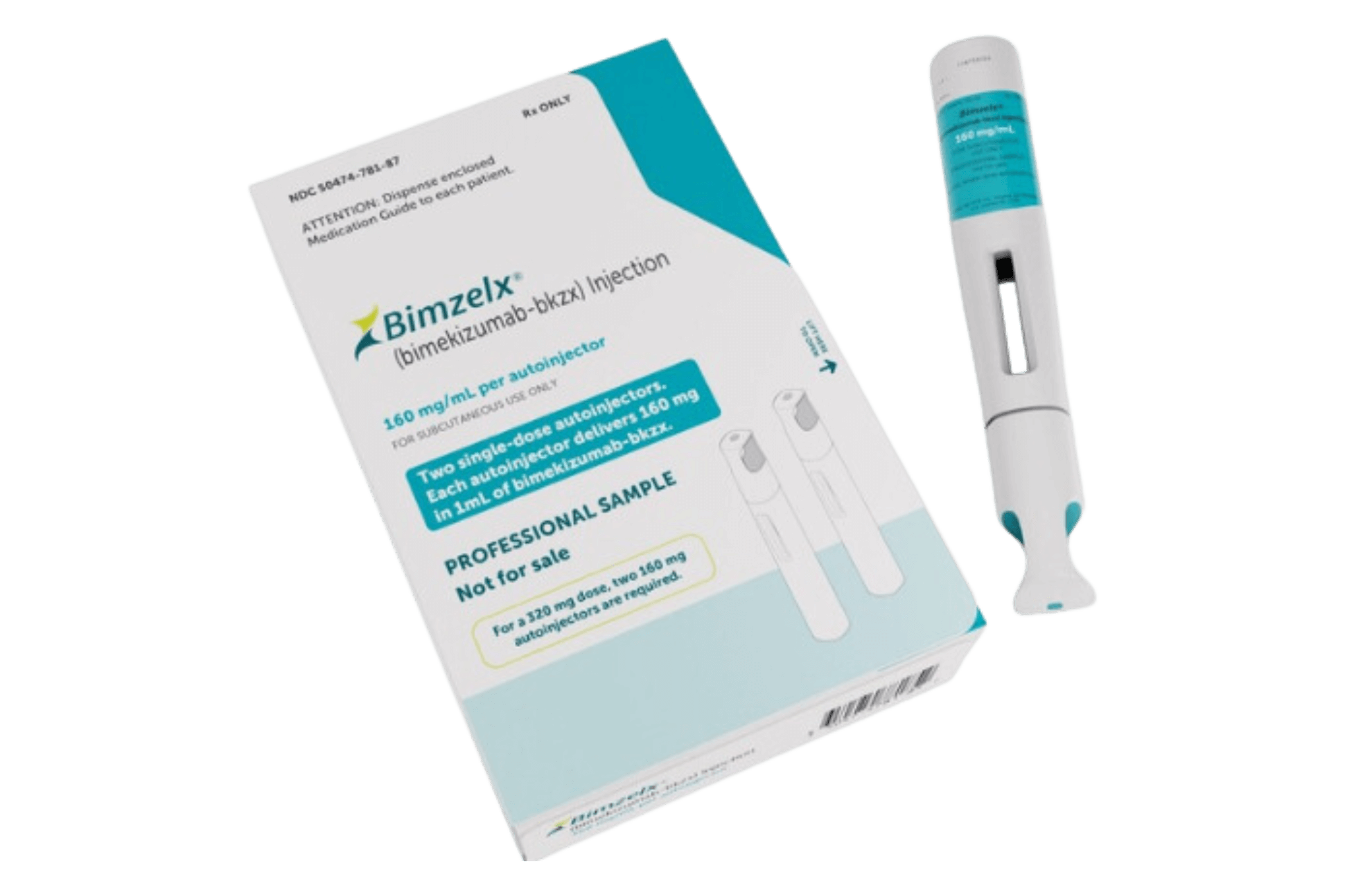Bimzelx (
generic name: bimekizumab) a humanized monoclonal antibody designed to inhibit the activity of interleukins
IL-17A and
IL-17F, proteins that play a significant role in inflammatory processes. By targeting these cytokines, Bimzelx helps reduce inflammation associated with certain autoimmune conditions.
Bimzelx is approved for the treatment of:
- Moderate to severe plaque psoriasis, which is a chronic skin condition characterized by red, scaly plaques. Bimzelx alleviates symptoms such as pain, itching, and scaling.
- Active psoriatic arthritis, which is an inflammatory arthritis associated with psoriasis, leading to joint pain and swelling. Bimzelx reduces inflammation, thereby decreasing pain, stiffness, and swelling in and around the joints.
- Axial spondyloarthritis, which is an inflammation of the spinal joints, including without visible X-ray damage (non-radiographic axial spondyloarthritis) and with visible X-ray changes (radiographic axial spondyloarthritis).
Bimzelx helps reduce back pain, stiffness, and fatigue in these conditions.
- Moderate to severe hidradenitis suppurativa. Hidradenitis suppurativa is a chronic skin disease causing painful nodules, abscesses, and lesions that may leak pus. Bimzelx reduces inflammatory nodules, abscesses, and associated pain from this condition,
Dosage
It is essential to follow the dosage regimen set by the prescribing doctor. The usually recommended dose for Bimzelx varies based on the condition being treated:
- Plaque Psoriasis: Dose of 320 mg (administered as two subcutaneous injections of 160 mg each) at four-weekly intervals for four months, followed by a maintenance dose of 320 mg every eight weeks thereafter. For patients weighing 120 kg or more, a maintenance dose of 320 mg every 4 weeks after week 16 may be considered.
- Psoriatic Arthritis: 160 mg subcutaneously every four weeks. For patients with coexistent moderate-to-severe plaque psoriasis, the dosing regimen for plaque psoriasis will usually be used.
- Axial Spondyloarthritis and Ankylosing Spondylitis: 160 mg subcutaneously every four weeks.
- Hidradenitis Suppurativa: Doses of 320 mg for three months, followed by maintenance doses of 320 mg every eight weeks thereafter.
Storage
Bimzelx should be stored in a refrigerator at 2°-8°C (36°-46°F) in its original carton to protect it from light. Do not freeze. If necessary, Bimzelx can be stored at room temperature up to 25°C (77°F) for a maximum of 25 days, after which it should not be refrigerated again. Once stored at room temperature, it must be used within the 25-day period or discarded. Do not use Bimzelx if it has been frozen or left at room temperature beyond the specified duration. If in any doubt, consult our blog on safe medicine management.
Common Questions About Bimzelx
How is Bimzelx administered?
It is given as a subcutaneous injection, either by a healthcare provider or self-administered after appropriate training.
Can axial spondyloarthritis be cured?
While incurable, axial spondyloarthritis symptoms can be effectively managed with medications like Bimzelx, lifestyle changes, and physical therapy.
Are interleukin inhibitors safe for long-term use?
Long-term use is generally safe under medical supervision, but regular monitoring for infections and adverse effects is essential.
This text is for informational purposes only. Please consult a doctor or pharmacist before using any medication.
Read the information leaflet that comes with the medication.
Most people who use Bimzelx do not experience any adverse side effects. Doctors prescribe this medication because they assess the benefits of such treatment outweigh any likely unwanted effects.
Some of the side effects that have been reported include upper respiratory tract infections, oral candidiasis, headache, and injection site reactions.
Not all side effects are listed here. If these or other unlisted symptoms persist or worsen, consult a healthcare provider or pharmacist.
Bimzelx is recommended for the treatment of:
- Moderate to severe plaque psoriasis: A condition characterized by thickened, inflamed, scaly skin.
- Active psoriatic arthritis: An inflammatory condition associated with psoriasis that causes joint pain, swelling, and stiffness.
- Axial spondyloarthritis: Including non-radiographic and radiographic axial spondyloarthritis (ankylosing spondylitis), marked by chronic spinal inflammation and stiffness.
- Moderate to severe hidradenitis suppurativa: A painful, chronic skin disease involving inflamed nodules and abscesses.















